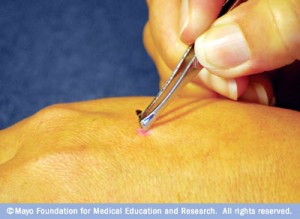READY TO GET STARTED?
REQUEST A FREE ESTIMATE
Fill out the form below or call (888) 466-7849 for a free, no-obligation estimate.
Yellow jackets have barbed like pointers on their stinger that cause the stinger to get lodged into the skin. The stinger is usually left behind, along with the venom sac. It is important to remove a stinger as quickly as possible because venom can continue to be released even if it’s not attached to the bee. The venom can cause an allergic reaction or a possible infection.

Source: Mayo Clinic
Symptoms of infection include:
Consult your Doctor immediately if any of these symptoms occur.
Symptoms of an allergic reaction include:
Consult your Doctor immediately at signs of an allergic reaction.
What to do if stung:
It’s very important to call a pest professional if you believe a yellow jacket nest is near your property. We DO NOT recommend you try to remove this on your own…this could result in being stung.
For yellow jacket removal, wasp removal, and hornet removal, call the professionals at Northwest Exterminating.
Other blogs: How to Treat a Yellow Jacket Sting